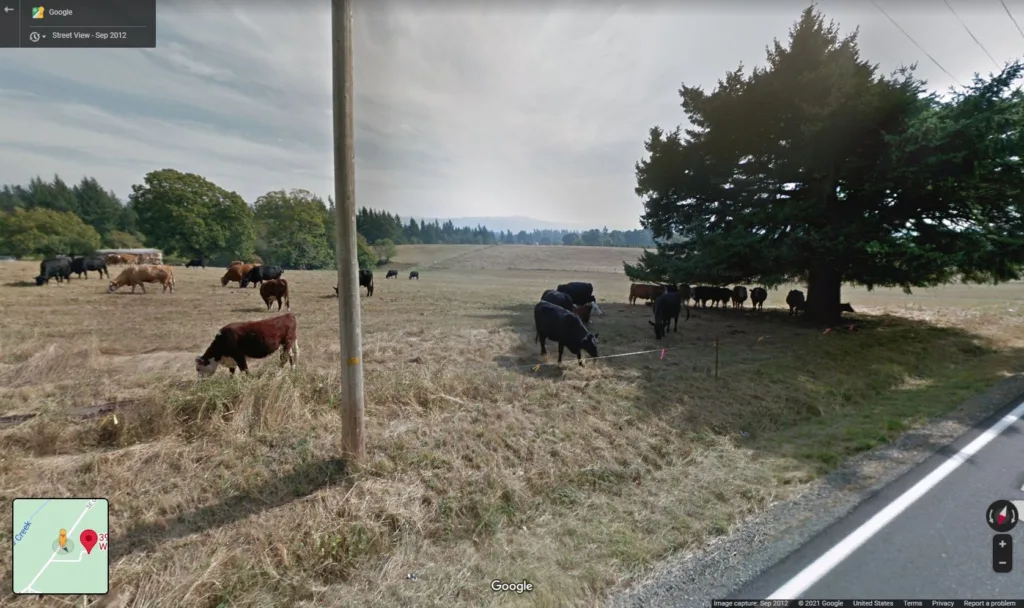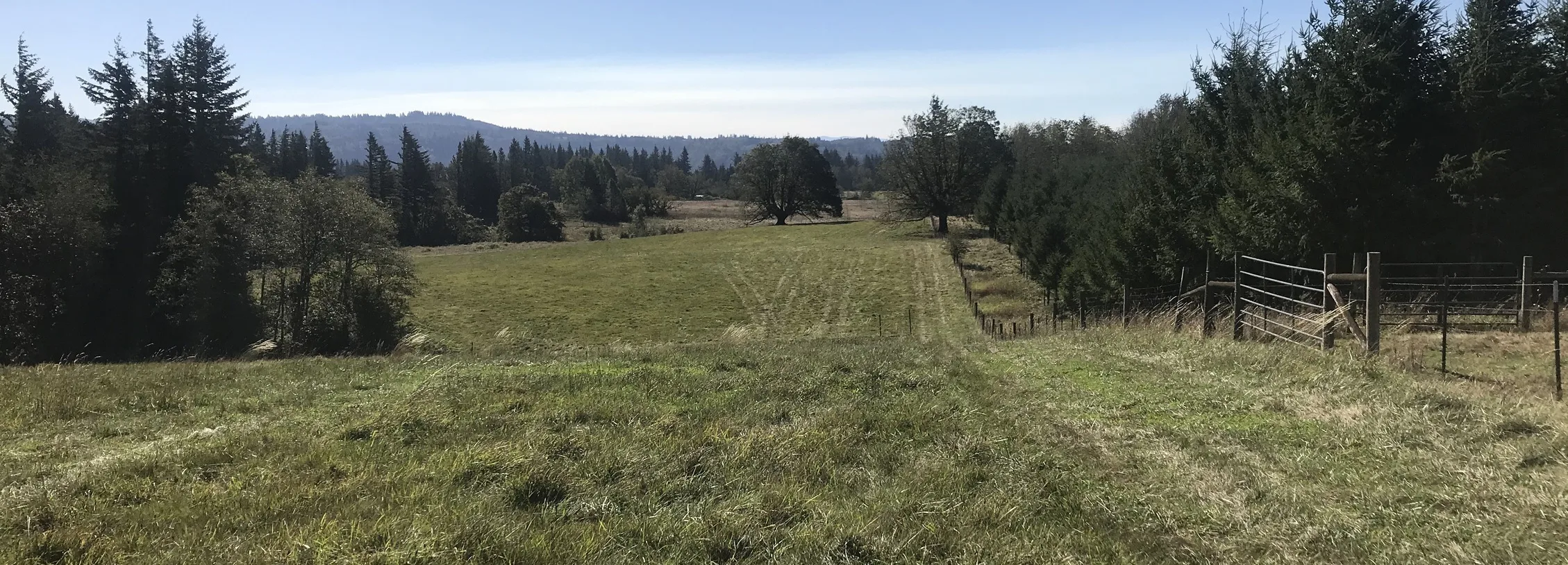By Nathan Baker
Senior Staff Attorney
May 2, 2023
Yesterday, capping off nearly two years of litigation, the Columbia River Gorge Commission issued an important appeal decision in favor of Friends of the Columbia Gorge that will protect farmland in the Columbia River Gorge National Scenic Area for future generations, just as Congress intended when it passed the National Scenic Area Act in 1986. The Commission’s decision not only protects the specific farmland in Clark County involved in this case, but also establishes precedent for protecting Gorge farmland throughout the National Scenic Area.
A long-standing family farm
Although the legal issues in the case were numerous and convoluted, the underlying facts were simple. In 1955, Charles DeTemple purchased several parcels of land on SE Gibson Road in eastern Clark County. For decades, Charles and his brother Frank DeTemple farmed their Gorge property in conjunction with their family farm in the Fern Prairie neighborhood elsewhere in Clark County. Later, the DeTemples leased their Gorge property to other nearby farmers to graze their cattle and produce hay.
In 1986, Congress passed and President Ronald Reagan signed into law the National Scenic Area Act, which in pertinent part requires the Gorge Commission, U.S. Forest Service, and Gorge counties to “protect and enhance agricultural lands for agricultural uses.” Congress ostensibly felt strongly about protecting Gorge farmland, because that is the very first mandatory standard for the National Scenic Area rules listed in section 6(d) of the Act.
In 1991, when adopting the original Gorge Management Plan as required by the National Scenic Area Act, and in recognition that the DeTemple farm was being used as farmland and was suitable for both farming and forestry, the Gorge Commission applied a “Large-Scale Agriculture” designation to the entire DeTemple farm.
Farm parcels sold off
In 2017, Mr. DeTemple passed away at the age of 92. Three years later, his estate sold the multiple constituent parcels that made up the DeTemple farm to new landowners.
Three of the parcels were purchased by three real estate development companies owned by John and Georgiana Warta and their family members, who even before they purchased the property announced to Clark County officials their desire to build three very large houses on the former DeTemple farm, thus permanently converting this prime farmland to residential development. The Wartas are no strangers to legally questionable development plans in the Gorge, having lost numerous lawsuits and appeals in their unsuccessful efforts to pursue a prior development proposal in neighboring Skamania County a decade ago.
In July 2020, the Wartas, through one of their companies, Norway Green, LLC, filed a land use application with Clark County to build a 7,124-square-foot non-farm dwelling (“a single-family dwelling not in conjunction with agricultural use”), plus a 5,940-square-foot agricultural building, on one of the parcels that was once part of the DeTemple farm.

Norway Green claimed that the approximately 41-acre parcel is predominantly unsuitable for agriculture (even though it had been farmed for decades and was still being farmed), and yet simultaneously claimed that a large barn was needed on the parcel in order to continue farming it. Norway Green’s internally inconsistent proposal was unprecedented in the history of the National Scenic Area. Never before had an applicant claimed that they needed an agricultural building in order to farm the property, while simultaneously claiming that the very same property is also predominantly unsuitable for agriculture and therefore entitles them to a non-farm, residential development, to be sited on the same farmland that is currently being farmed.
The Wartas, through their companies, also obtained substantial tax breaks from Clark County to use the property for both farming and forestry. But if they were to also obtain land use approvals from Clark County to build three non-farm dwellings, the Wartas would not be required to keep farming the property in the future.
After hearing several hours of testimony and legal arguments, the Clark County Land Use Hearing Examiner denied Norway Green’s land use application because Norway Green had failed to meet its burden to prove that the 41-acre parcel is predominantly unsuitable for agriculture. Among other problems, Norway Green’s own farming consultant, plus multiple local winemakers, opined that the parcel could potentially be used as a vineyard. Other farming experts testified on behalf of Friends that multiple other agricultural products can be produced from the parcel, that the parcel is predominantly suitable for agriculture, and that Norway Green can earn a monetary profit from farming the parcel.
Gorge Commission rejects Norway Green’s arguments
After the Clark County Hearing Examiner denied Norway Green’s application, both sides appealed. In the Gorge Commission’s corrected written decision issued yesterday, the Commission rejected all of Norway Green’s arguments and agreed with several of Friends’ arguments, while deciding that the remainder of Friends’ arguments were moot given the disposition of the case.
First, the Gorge Commission rejected Norway Green’s arguments that Friends had the burden of proof during the proceedings before the Clark County Hearing Examiner, and that Friends had somehow become the “applicant” during those proceedings.
Second, the Gorge Commission rejected Norway Green’s arguments that Clark County was forcing Norway Green to commercially log the wooded portion of the parcel. The Clark County Hearing Examiner did not require Norway Green to log that portion of the parcel, but merely recognized that Norway Green could do so if it wants to increase agricultural production from the parcel as a whole.
Third, the Gorge Commission rejected Norway Green’s arguments that the parcel is predominantly unsuitable for agriculture. Although a portion of the parcel is currently used for growing timber, that does not mean that portion of the parcel is not also suitable for agricultural production. Norway Green tried to convince the Hearing Examiner and the Gorge Commission to treat farming and forestry as mutually exclusive, when in fact in most cases in the National Scenic Area (including on this property), these uses are interchangeable. The Gorge Commission also rejected Norway Green’s arguments that environmental features (including streams and a wetland) on the parcel made it predominantly unsuitable for agriculture.
Fourth, the Gorge Commission rejected Norway Green’s arguments that Clark County’s denial of the land use application was an unconstitutional taking. The County’s decision did not require Norway Green to give up any portion of its property, nor make any monetary payment in exchange for approving the land use application.
Fifth, the Gorge Commission agreed with Friends that when reviewing agencies (including counties and the Gorge Commission staff) review applications for non-farm dwellings in the National Scenic Area, they must evaluate the capability of the subject parcel to be farmed in conjunction with other agricultural operations in the area. This is a mandatory factor in evaluating whether a parcel is predominantly suitable or unsuitable for agriculture, and it cannot be ignored regardless of how the other factors are evaluated.
Finally, the Gorge Commission agreed with Friends that the Clark County Hearing Examiner erred by failing to consider the suitability of the parcel for producing other types of agricultural products than just “farm crops and livestock.” As a couple examples of agricultural products that had been impermissibly excluded from the analysis, the Gorge Commission cited honeybees and Christmas trees, both of which are expressly listed in the National Scenic Area definition of “agricultural use.”
In denying a subsequent motion for reconsideration, the Gorge Commission also rejected numerous arguments by Norway Green that the Commission’s process had been unfair and denied due process to Norway Green.
Norway Green has 60 days to appeal the Gorge Commission’s decision to Superior Court, should it choose to do so.
Putting the voyage back on course
The Gorge Commission’s decision establishes important precedent for how to comply with Congress’s mandate to protect farmland in the Columbia Gorge, a rapidly diminishing resource. If and when a non-farm dwelling is approved in the National Scenic Area, the underlying parcel is permanently converted by law to residential (non-agricultural) use. For that reason, it is important for county planning departments, Gorge Commission staff, and other decision makers to correctly apply the rules for non-farm dwellings.
Review of an application for a non-farm dwelling should start with a presumption that the Gorge Commission got it right when it chose a Large-Scale Agriculture designation for a parcel. Only if and when an applicant definitively establishes that a parcel is predominantly unsuitable for agriculture—essentially, that the Gorge Commission mistakenly applied the wrong zoning when adopting the Gorge Management Plan decades ago—could a parcel be potentially eligible for a non-farm dwelling.
When it comes to protecting farmland in the Columbia River Gorge, Congress charted the course in 1986. Five years later, the Gorge Commission and U.S. Forest Service took a very important early step in the voyage by adopting the original Gorge Management Plan.
After some slight drift over the decades, the Commission’s decision yesterday gets things back on course by returning other agencies, land use applicants, and interested persons to the correct, originally intended planning principles for reviewing applications for non-farm dwellings in the National Scenic Area. If properly implemented, the Commission’s decision will help protect Gorge farms from fragmentation, parcelization, and permanent conversion to large “trophy homes” and other non-agricultural overdevelopment.
As Senior Staff Attorney, Nathan Baker is responsible for managing the organization’s legal efforts to protect the resources of the Columbia River Gorge. Since Nathan joined Friends in November 2000, Friends has participated in more than one hundred legal cases, losing less than fifteen percent of them. Nathan is licensed to practice law in both Oregon and Washington. He has edited and written for several legal publications on environmental and land use topics. While studying at Lewis & Clark Law School, he served as student body president and worked as a law clerk for the Pacific Environmental Advocacy Center (now Earthrise Law Center) and as the Law School’s alternative transportation coordinator.




